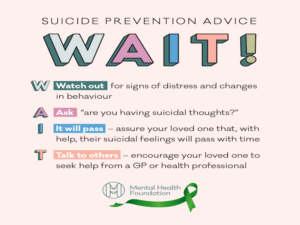Prevention is something that we can all individually help with. A short conversation with another person can sometimes be enough to make the difference between life and death for them.
The advice ‘WAIT’ is one good way to remember how you can support another person who may be suicidal. It stands for:

Watch out for signs of distress and uncharacteristic behaviour
- e.g. social withdrawal, excessive quietness, irritability, uncharacteristic outburst, talking about death or suicide
Ask “are you having suicidal thoughts?”
- Asking about suicide does not encourage it, nor does it lead a person to start thinking about it; in fact it may help prevent it, and can start a potentially life-saving conversation
It will pass – assure your loved one that, with help, their suicidal feelings will pass with time
Talk to others – encourage your loved one to seek help from a GP or health professional
Please click here for WAIT in a poster format
Seek help for yourself
If you yourself are feeling like ending your life, please call 999 or go to A&E and ask for the contact of the nearest crisis resolution team. These are teams of mental health care professionals who work with people in severe distress.
Other sources of help include:
- Samaritans offer a 24-hours a day, 7 days a week support service. Call them FREE on 116 123. You can also email jo@samaritans.org
- Papyrus is a dedicated service for people up to the age of 35 who are worried about how they are feeling or anyone concerned about a young person. You can call the HOPElineUK number on 0800 068 4141, text 07786 209697 or email pat@papyrus-uk.org
- NHS Choices: 24-hour national helpline providing health advice and information. Call them free on 111.
- C.A.L.M.: National helpline for men to talk about any troubles they are feeling. Call 0800 58 58 58.
- Support After Suicide Partnership offers practical and emotional support on their website for people bereaved and affected by suicide.
This information was provided by the Mental Health Foundation.

